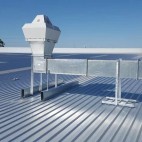Welcome to another edition of South Africa’s favourite energy quarterly, it has certainly been another pulsating time for energy sector since we last touched base. The nuclear deal versus renewable energy argument has undoubtedly been the central talking point, and we hear from both sides of debate in this edition.
There is certainly a place for nuclear in the energy mix, but it should not be a primary driver, given our wealth of free solar radiation and gusty coastlines, renewable energy could easily account for 50% of our energy mix, especial with improvements in storage capabilities and pricing from lithium-iron batteries and hydrogen fuel cells, to name a few; coupled with innovative hybrid technology to incorporate gas.
We need some nuclear at this stage, unless we are committed to lessening the coal dependence issue. Building the additional coal stations was a poor move in the first place if the powers that be had nuclear ambitions. That money could have been spent developing various forms of energy, including nuclear on a smaller scale. A mix of various energies is essential to the health and well-being of any growing economy.
Credit must go to the renewable sector for the work done thus far, helped by huge investments from the private sector, less so from the public sector - relative to the numbers thrown around for the nuclear deal or new coal power stations.
If that kind of money was pumped into renewables, our electricity problems, and the side effects from burning large amounts of coal, would (arguably) largely be over. Poor air quality is noticeable when travelling to Gauteng from Cape Town. When driving between Joburg and Pretoria I’m also amazed at the relative lack of any noticeable ‘greening’ on warehouses.
Roof space is largely without solar or grey water systems, with the industrial designs not looking any different than 30 years ago. By law any new building should have to comply with green principles to pass code. Having said that, I did see a few more solar installations than 2016 but more can still be done.










